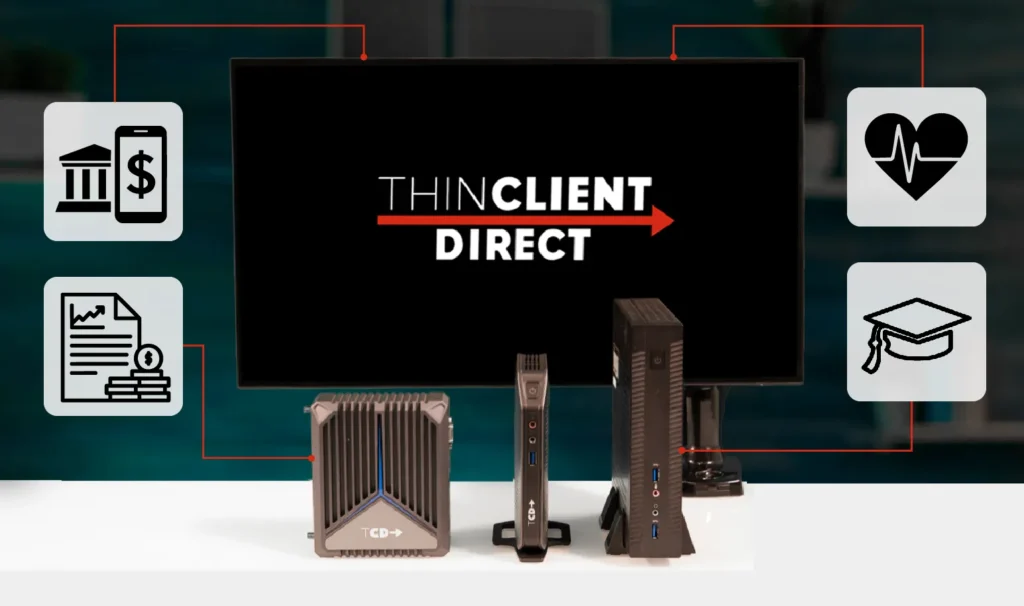Thinking Win IoT OS for Accessing AVD or Windows 365? Think Again…
November 3, 2024

Choosing the right operating system is critical for organizations that rely on Virtual Desktop Infrastructure (VDI) environments. Many businesses have long trusted Windows IoT or Windows Embedded for their VDI needs, thanks to their streamlined, fixed-function capabilities and reliability in specialized or industrial environments. However, these options must be improved significantly when accessing Microsoft Azure Virtual Desktop (AVD) or Windows 365.
Why Windows IoT OS Falls Short for AVD and Windows 365
Windows IoT OS is designed for embedded systems with minimal interfacing and specialized functions. This design choice makes it perfect for task-specific operations, but it comes with limitations—most notably, the absence of the Microsoft Store. Windows IoT OS cannot support these services since the Microsoft Store hosts the critical Windows App required to access AVD and Windows 365. Without the Store, users can’t directly deploy or manage the apps necessary to interface with AVD or Windows 365.
As a result, for organizations that need seamless access to AVD and Windows 365, Windows 11 emerges as the primary option. While all versions of Windows 11 technically support AVD and Windows 365, Windows 11 Enterprise is particularly recommended for its advanced features, like write filtering mechanisms. Write filtering is essential for protecting the hard drive from unwanted changes and reducing the attack surface, which is crucial for organizations concerned about security in their virtual desktop setups. This added layer of protection makes Windows 11 Enterprise an ideal choice for companies aiming to secure their devices more robustly in a VDI environment.
While Microsoft may eventually extend AVD support to Windows IoT OS, no official announcements have clarified such intentions. For now, businesses looking to connect with AVD and Windows 365 through an OS will find Windows 11 the most feasible choice.
The Heavyweight Drawbacks of Windows 11
Though Windows 11 provides full access to the Microsoft ecosystem and essential Store apps, it can also be resource-intensive. This may not be ideal for organizations seeking a lightweight or cost-effective VDI solution, especially if they plan to use endpoint devices with limited processing power or memory. Windows 11’s frequent updates and system requirements can burden less powerful devices and may demand more attention from IT departments, who need to maintain these updates and address any compatibility issues.
For users who require AVD or Windows 365 but want to avoid the resource-heavy nature of Windows 11, a lightweight alternative may offer a practical solution.
Why a Linux-Based OS is an Ideal Alternative
A Linux-based OS can be a highly efficient, cost-effective choice for users who value performance and flexibility. Linux is known for its lightweight operation, security, and adaptability, making it an attractive option for businesses seeking to maintain speed and simplicity on endpoint devices. While Linux doesn’t natively support the Microsoft Store, it can still access AVD and Windows 365 via web clients and other remote access tools, offering a path forward without the limitations of Windows IoT or the demands of Windows 11.
In contrast to Windows IoT, Linux offers the flexibility of lightweight configuration while still delivering reliable access to virtual desktops. Businesses can avoid the weight of Windows 11’s system requirements while still achieving their goals in virtual desktop management.
Conclusion
While Windows 11 remains the most straightforward and fully supported choice within the Microsoft ecosystem for accessing AVD and Windows 365, a Linux-based OS can be a powerful, flexible alternative for those seeking a lighter, more streamlined approach. Until Microsoft officially extends AVD compatibility to Windows IoT OS, Windows 11 and Linux remain the go-to options for most businesses. Windows 11 Enterprise, with its write filtering and enhanced security features, is ideal for those needing more vital device protection. At the same time, Linux offers simplicity, security, and cost-efficiency in a VDI environment.
Ready to Streamline Your VDI Solution? Contact ThinClient Direct
Are you seeking a secure, cost-effective VDI setup tailored to your needs? At ThinClient Direct, we specialize in customizable, OS-agnostic Thin Clients ideal for AVD, Windows 365, and other VDI environments. Whether you’re interested in leveraging Windows 11 Enterprise or exploring the benefits of a Linux-based OS, our team can help you deploy a solution that balances security, performance, and cost-efficiency.
Contact us today to learn how ThinClient Direct can provide future-proof, adaptable Thin Client hardware and expert support for your VDI infrastructure. Let’s optimize your virtual desktop experience—efficiently and effectively.



